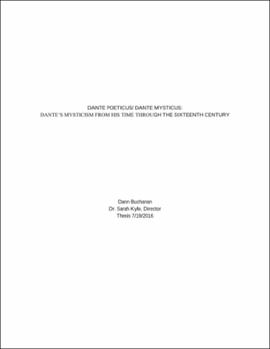| dc.contributor.advisor | Kyle, Sarah Rozalja | |
| dc.contributor.author | Buchanan, Dana | |
| dc.date.accessioned | 2020-07-09T14:39:19Z | |
| dc.date.available | 2020-07-09T14:39:19Z | |
| dc.date.issued | 2016 | |
| dc.identifier.other | (AlmaMMSId)9982474184502196 | |
| dc.identifier.uri | https://hdl.handle.net/11244/325034 | |
| dc.description.abstract | The relationship of Dante Alighieri (1265-1321) to mysticism has been investigated in a surprisingly lopsided manner by scholars. That Dante was influenced by mystics who lived before him is not seriously in question, and not merely because Dante himself claimed to have read, and to have been writing in the tradition of, Bernard of Clairvaux (1090-1113) and Richard of St. Victor (1110-1173). Writing in 1913, the scholar of Italian literature Edmund Gardner cataloged 182 passages in the Divina Commedia that appear to be parallels to passages in the writings of mystics Dante would likely have read, most notably Pseudo-Dionysius (fl. early 6th c.-hereafter Dionysius), Bernard, and Mechtilde of Hackethorne (1240-1298). Dante was no mere copyist, however-he did not lift catchy-sounding passages from earlier writings and insert them into his own poetry. He understood the ideas of those mystics and wove them into the fabric of his epic. Recently, for example, Lino Pertile has persuasively argued that Dante, like Bernard of Clairvaux, understood the beatific vision not as the end of mystical attainment, but the beginning thereof, the beginning of the call to continued thirst for union with the divine. Scholars who address the question of the mystics who influenced Dante are attempting to answer a fundamental and important question about Dante's relationship to mysticism. But the same body of work also raises other questions, two of which I aim to answer in this thesis. The first of these other two questions is this: was Dante himself a mystic, and if so, what can we begin to say about the nature of his mysticism? As I argue in this thesis, this question should be answered in the affirmative. Dante was, indeed, a mystic who recognized that desire is the engine of progress on the mystical path, and that desire must be transformed before union with God can be achieved. As a result of these features of Dante's mystical thought, he interpolated an investigation of sin on the journey of a contemplative to direct experience of God. The second question to be answered in this thesis is an obvious development from the first question: as a mystic, did Dante influence mystics who came after him? In this thesis, I shall present evidence that Dante's innovations can be recognized in the thought of later mystics. | |
| dc.rights | All rights reserved by the author, who has granted UCO Chambers Library the non-exclusive right to share this material in its online repositories. Contact UCO Chambers Library's Digital Initiatives Working Group at diwg@uco.edu for the permission policy on the use, reproduction or distribution of this material. | |
| dc.subject.lcsh | Mystical union | |
| dc.subject.lcsh | Mysticism | |
| dc.subject.lcsh | Christianity | |
| dc.subject.lcsh | Transcendence (Philosophy) | |
| dc.title | Dante Poeticus/ Dante Mystics : Dante's Mysticism from his time through the sixteenth century. | |
| dc.type | Academic theses | |
| dc.contributor.committeeMember | DeBolt, Darian | |
| dc.contributor.committeeMember | Law, Stephen C. | |
| dc.thesis.degree | M.A., Humanities and Philosophy | |
| dc.subject.keywords | Christianity | |
| dc.subject.keywords | Dante | |
| dc.subject.keywords | Love Mysticism | |
| dc.subject.keywords | Mystical Itinerary | |
| dc.subject.keywords | Mysticism | |
| dc.identifier.oclc | (OCoLC)ocn962027855 | |
| uco.group | UCO - Graduate Works and Theses::UCO - Theses | |
| thesis.degree.grantor | Jackson College of Graduate Studies. | |
